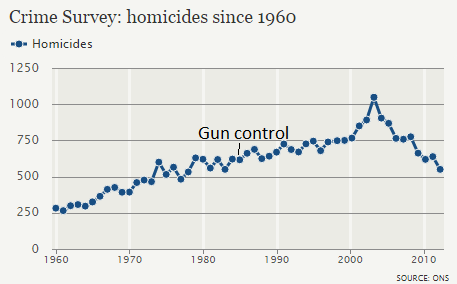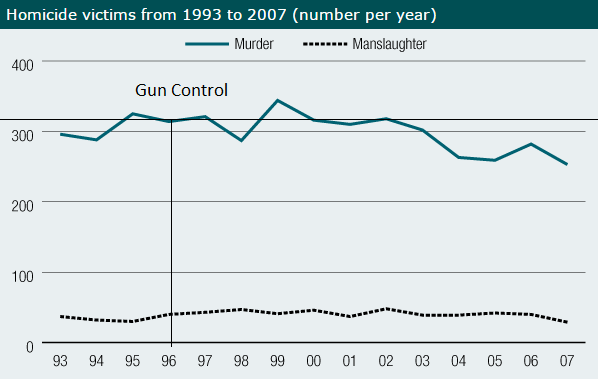A common thing I hear when discussing gun control is that it has "worked" in certain countries. The argument people present is that, "obviously", if it worked in one country, it must be able to work in another. While this is debatable in it's own right, given the myriad of potential factors for crime including economics, poverty, culture, law enforcement effectiveness, technological development, and the general presence of organized crime, it nonetheless is an argument that I feel needs to be addressed. For all intents and purposes, for gun control to have "worked" in these country's, we would expect the homicide rate to go down after a major gun ban, at least initially. Instead in both country's the homicide rate spiked soon after and didn't come down until at least a decade later, of which during this time crime was falling in the U.S. despite lacking the supposed gun ban. It's difficult than to say that Australia or the UK's gun control measures had a positive impact on lowering crime, since soon after crime spiked. While they may still be lower than the U.S., this does not mean that their gun control measures are responsible for why. They were lower than the U.S. before and after, and for all intents and purposes their numbers went up afterwards. To attribute the lower homicide rate with gun control is obviously a logical fallacy.
It's important to remember that correlation does not imply causation; just because violence decreased or increased after a particular gun control measure, it does not necessarily mean that gun control was responsible. For instance, homosexuality acceptance was linked to a hurricane by some, but it would be unreasonable to assume that the hurricane was magically created due to the acceptance of gays. One thing does not always lead to another; coincidences do exist. It's unreasonable to think that, despite the thousands of other laws, eventualities and millions of people living in a country, that one single set of laws could possibly be responsible, in it's own right, for the reduction of all crime. Clearly, there are a number of factors at play; some poor countries have low crime due to the fact that the people live peacefully, such as in tribal societies. Other poor societies have high crime due to their inability to police it. Some rich societies have low crime due to their ability to fund law enforcement efforts, while others have high crime due to being targets due to that wealth. It's impossible for any single factor to explain why crime happens, in the largest part due to the unpredictability of human nature in general. Solving crime then takes working on a wide spectrum of issues, rather than any single factor.
When we compare most countries across the world, we don't actually find that high of a correlation between violence and homicide in general, and gun control or the total presence of firearms tends to be, at the very most, a fairly minor issue to determining total violence figures. Gun violence is but one form of violence, and one form of homicide; without them, individuals can still hurt others, and will in time learn to use alternatives that tend to be more effective. For instance in Japan, the Yakuza notoriously use swords and other weapons to commit their crimes, to much the same effect that a gun would; especially with the right training, it's easy to imagine someone being just as deadly with a sword or knife, as with a gun. While I have written another piece on this entirely, the question at hand in this particular conversation is, what was it's impact in the UK and Australia?
The Actual Figures
Despite all these precursory arguments, the meat of the conversation rests solely on the shifting of crime figures, and in particular homicide, of Australia and the UK. While commonly cited for reasons why the U.S. should change it's gun control measures, there's often not clear evidence provided for it. If we take a look at the statistics at face value (as in, assume that the definition for homicide is the same for both countries, that one doesn't have more manslaughter than murder charges etc.), we do see that both the UK and Australia have a lower homicide rate than the U.S., and stricter gun control. To many, this is already the nail in the coffin; after all, if they have strict gun control and lower homicide rates, it must be because of the gun control, right? There's no other possible alternatives that could exist. I however, like to dig deeper. For it to really be proof that gun control worked, we would need to see crime rates go down significantly after gun control measures are passed. After all, if a country had lower crime than the U.S. BEFORE gun control measures were passed, surely we can't attribute all of it's low crime to gun control in it's entirety? A law passed in the future couldn't possibly have retroactively made crime lower in the past.
Because gun control is not an exact value, determining the exact date when gun control became "strict" is obviously more an art, than a science. While more or less gun control laws varies by country, the impact of these laws vary considerably, such as 50 laws governing minute details on a gun such as the way it can be held or length of the barrel, and one single that law that might for instance say "all guns are banned". Because the impact and strictness and value all vary considerably, it's difficult to say within any degree of certainty if strict gun control measures "worked". What is much easier to measure however is the dates when gun control occurred, particularly in response to certain forms of violence. After several key violent incidents, both Australia and the UK banned certain forms of firearms, or made them harder to obtain.
The Charts
As a response to a single mass shooting event, the Hungerford massacre, In 1988, the UK banned semiautomatic weapons, as well as a host of other weaponry, and almost completely banned handguns in 1997. Pushing them to the prohibited category, these types of guns, semiautomatic, so-called "assault weapons" and the like, were made illegal or incredibly difficult to get ahold of. Australia did the same, after the Porth Arthur Massacre in 1996, Australia implemented harsh gun controls, banning the equivalent and more of assault weapons.
The population of the UK has increased marginally since the 1980's, from 56 million to 62 million. In the UK, the number of homicides, pre-gun ban, in 1983, was 550. By 2010, it was 619, which puts it at roughly the same rate (murder per capita) as it was in 1983, before gun control was enacted. So, gun control, at best, seems to in 27 years, have not changed the end result of crime all that much. However, there was a peak of 1047 in 2003. So, after gun control, murder was actually higher for nearly every single year after until 2010. It's hard to say that gun control then had a positive impact. As of 2017, the Homicide rate was back up to 736, mitigating this slight drop entirely.
The population of Australia has also remained relatively constant since 1993, going from 18 million to 21 million from 1993 to 2007. [1] In Australia, there were about 300 homicides in 1993, and by 2007, there were 260. It's natural for a countries crime rates to fall as development increases, so a marginal decrease eventually is to be expected. In 1996, Australia implemented it's harsh gun control, and immediately following this crime spiked, reaching a peak of 350 in 1999, and it did not dip below 300 (the 1993 level) again until 2003, nearly a decade later. Homicide only fell about 15% in their country as of 2007, after initially spiking. Looking past the chart, in 2012, it's back up to about 300 per year or, 297, which completely mitigates it's benefit.
But, as many will be quick to point out, crime is finally lower than it was those 30 years ago, so, isn't that proof that it worked to some extent? Even though it initially spiked for 30 years?! It's hard to say that, gun control was responsible for the reduction of crime so many more decades later. A country's crime rate is expected to fall consistently along with it's technological and societal development, and it only seemed to increase until about 2003 in both countries, when it finally started to drop. In the U.S., during the same time frame, they had a peak of 24,530 murders in 1993, and fell to 14,249 in 2014, or the homicide number dropped well over 40%, compared to about 10% or so in Australia and the UK. Given the significant change in population, however (260 million to 320 million), the murder rate has fallen from 9.5 to 4.5, or by over half, or nearly 200%. So, in the same time, the U.S.'s murder rate fell by half, where as in both Australia and the UK after a major crime event involving firearms they enacted strict gun control laws, their crime went up and has only recently fallen to back where it was. Comparatively, the U.S.'s crime rates have fallen more than the UK and Australia in the same time frame's.
Now, many more after this will still stick their guns and proclaim, the UK and Australia, despite their sudden spikes in crime, still had a lower total homicide rate than the U.S. And that is where the meat of the issue lies; even if accept the figures at face value, that the statistics aren't different or how we record "murder" and the like (as in, not a disproportionate amount of manslaughter to compensate or the like), the UK and Australia both had the same gun homicide rate before and after gun control, meaning that both countries had a lower homicide rate than the U.S. without gun control ever being enacted; in fact for all intents and purposes, it's almost equal now. In fact, if the results of the policy are to be considered from a purely correlative perspective, in the UK homicides were higher for 27 years, and they were higher for 14 years in Australia, before getting back to their levels BEFORE gun control, despite most industrialized countries falling in crime at the same time's. If that's the case, than how we can suggest that gun laws were responsible for their lower crime rate in comparison? They were lower before and after the gun laws and if anything, crime went up immediately following the gun laws. The Australia homicide rate was about 1.0 before and after gun control, and the UK homicide rate was about 1.2, but the U.S. fell from 9.5 to 4.5. When we look at how much we have improved, the U.S. seems to have faired better.


No comments:
Post a Comment